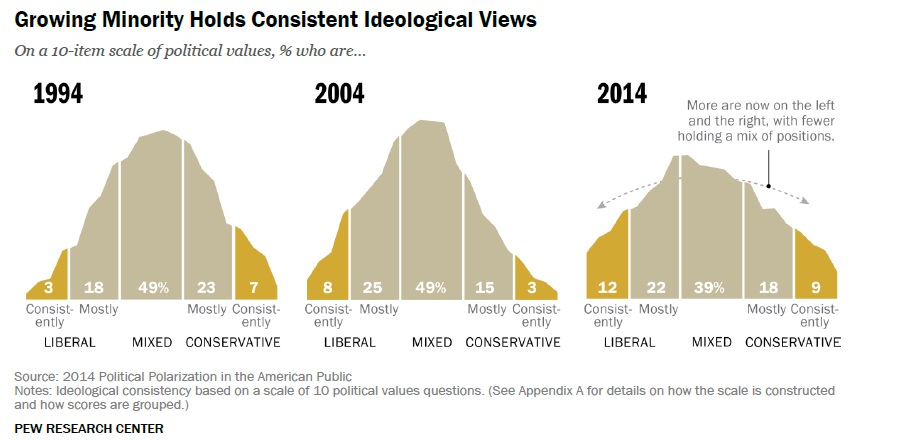Pew Research highlights Social, Political and Moral Polarization among Partisans, but more people are still Moderates
A recent research study by Pew highlights societal trends that have a lot of people worried about the future of our country. While many people have highlighted the political polarization that exists and others have pointed to the social and psychological trends underlying that polarization, Pew’s research report is unique for the scope of findings across political, social, and moral attitudes. Some of the highlights of the report include:
- Based on a scale of 10 political attitude questions, such as a binary choice between the statements “Government is almost always wasteful and inefficient” and “Government often does a better job than people give it credit for”, the median Democrat and median Republicans’ attitudes are further apart than 2004 and 1994.
- On the above ideological survey, fewer people, whether Democrat, Republican, or independent, are in the middle compared to 1994 and 2004. Though it is still worth noting that a plurality, 39% are in the middle fifth of the survey.
- More people on each side see the opposing group as a “threat to the nation’s well being”.
- Those on the extreme left or on the extreme right are on the ideological survey are more likely to have close friends with and live in a community with people who agree with them.
The study is an important snapshot of current society and clearly illustrates that polarization is getting worse, with the social and moral consequences that moral psychology research would predict when attitudes become moralized. That being said, I think it is important not to lose sight of the below graph from their study.

Specifically, while there certainly is a trend toward moralization and partisanship, the majority of people are in the middle of the above distributions of political attitudes and hold mixed opinions about political attitudes. It is important that those of us who study polarization don’t exacerbate perceived differences, as research has shown that perceptions of differences can become reality. Most Americans (79%!) still fall somewhere between having consistently liberal and consistently conservative attitudes on political issues, according to Pew’s research. And even amongst those on the ends of this spectrum, 37% of conservatives and 51% of liberals have close friends who disagree with them. Compromise between parties is still the preference of most of the electorate. If those of us who hold a mixed set of attitudes can indeed make our views more prominent, thereby reducing the salience of group boundaries, research would suggest that this would indeed mitigate this alarming trend toward social, moral, and political polarization.
– Ravi Iyer
